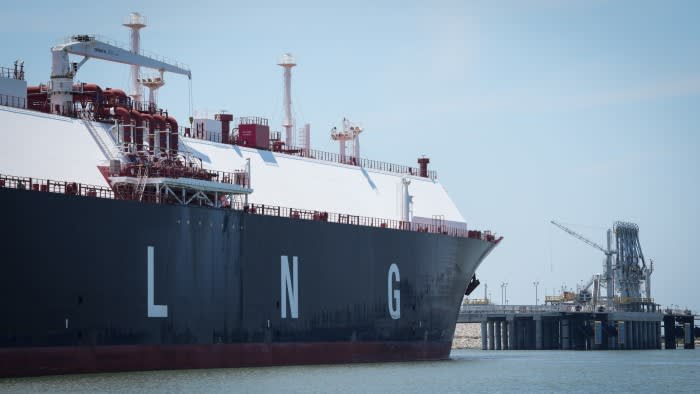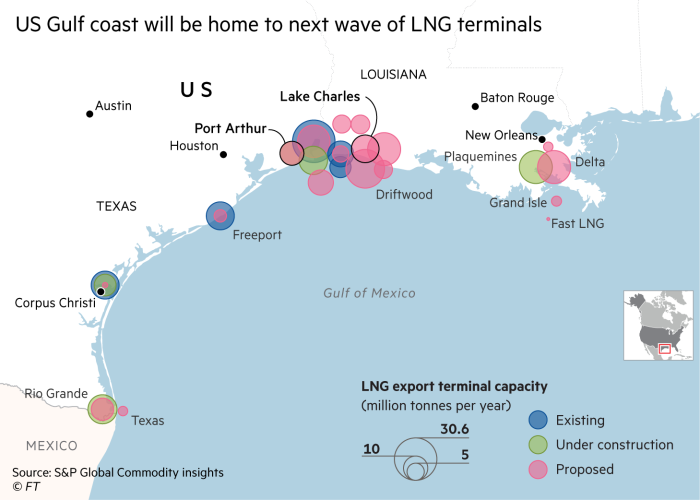
Stay informed with free updates
Simply sign up to the Oil & Gas industry myFT Digest — delivered directly to your inbox.
The US natural gas industry is on high alert as the Biden administration reconsiders the way it licences massive new export terminals for the fuel, under pressure from climate campaigners escalating a fight against fossil energy infrastructure.
Construction of liquefied natural gas terminals along the Gulf of Mexico and Atlantic coasts have vaulted the US above Qatar as the top global LNG exporter, enabling it to replace critical European supplies after Russia’s full-scale invasion of Ukraine.
The multibillion-dollar terminals have also become targets for climate activists who argue they lock in dependence on planet-warming fossil fuels for decades. Activists have intensified their campaign as President Joe Biden seeks re-election this year.
Campaigners have urged the US Department of Energy to update how it decides whether new LNG export projects are in the “public interest”. They want it to delay approval of Venture Global’s CP2 terminal in Louisiana, which is next in line for a permit and one of the largest projects along the Gulf coast.
Such authorisations, for exporting LNG to countries that lack a free trade agreement with the US, have been routine since the first projects were proposed more than a decade ago. Some Biden officials were now pushing for a significant review of the approval process, arguing that there was a better understanding of the environmental impact caused by infrastructure leaks and emissions, said a source with knowledge of the discussions who cautioned that no decision had been taken.
Industry executives say such a review would serve as a de facto moratorium on new projects, and warned of grave consequences as a result.
“Any infringement of US supply would have the same impact on the global economy as an economic sanction and would cause ripple effects spanning from deindustrialisation to food insecurity,” said Mike Sabel, chief executive of Venture Global.
Together with a neighbouring project under development, Venture’s CP2 would give the company alone an export capacity of more than 65mn tonnes of LNG a year, second only to Qatar. Activists have dubbed the project a “carbon bomb”.
“If the industry builds out everything it wants, there will be more greenhouse gases from US-exported LNG than from everything that happens in the continent of Europe,” said Bill McKibben, head of climate campaign group 350.org. “That’s why we’re asking the Department of Energy to halt new permits while they refigure their formula for deciding what’s in the public interest.”

Some local activists in Louisiana and Texas are also protesting LNG expansion.
“We can’t be approving more facilities and out of the same mouth talking about reaching climate goals and talking about phasing down fossil fuels,” said Roishetta Sibley Ozane, an activist based in Sulphur, Louisiana.
The US became the world’s largest LNG exporter in 2023. Its seven existing terminals can produce as much as 86mn tonnes a year, according to the Energy Information Administration — enough to satisfy the combined gas needs of Germany and France. Five more projects under development will add another 73mn tonnes a year and the energy department is reviewing proposals for at least another 16.
The activists’ campaign spotlights a dilemma for Biden, who promised on the campaign trail to lead a transition away from fossil fuels but has witnessed record levels of US oil and gas production and exports. After Russia’s invasion of Ukraine, he encouraged the growth of US LNG to shore up European supplies.
In November, more than 60 Democratic lawmakers called on the energy department to reassess how it determines whether new LNG projects are in the public interest citing “climate” concerns.
The American Petroleum Institute said that any Biden administration review of LNG approvals was a “really, really big deal”, which threatened to shut down development of the industry and undermine Europe’s energy security.
“What I think this means is that is least for 2024, there would be no permits granted for LNG export in the United States,” said Mike Sommers, API chief executive. “There is no reason to proceed with the development of a new LNG terminal if you don’t have permission to export it.”
Nick Dell’Osso, chief executive of gas producer Chesapeake Energy, said it was critical that regulators understood that as demand for the commodity booms, “the US is the most stable place from which to receive it”.
Securing Energy for Europe, a large state-owned energy company in Germany, wrote to US regulators in December urging them to approve Venture’s CP2, arguing it was “vital to Germany’s energy security”. Japanese power company Jera wrote a similar letter in support of CP2.
But analysts said there was a change of mood within the Biden administration in the run-up to the 2024 election.
“The LNG industry — after touting its role in helping Europe survive a near-cut-off of Russian gas — now faces new scrutiny,” said Ben Cahill, senior fellow at the Center for Strategic and International Studies.
Climate Capital

Where climate change meets business, markets and politics. Explore the FT’s coverage here.
Are you curious about the FT’s environmental sustainability commitments? Find out more about our science-based targets here
